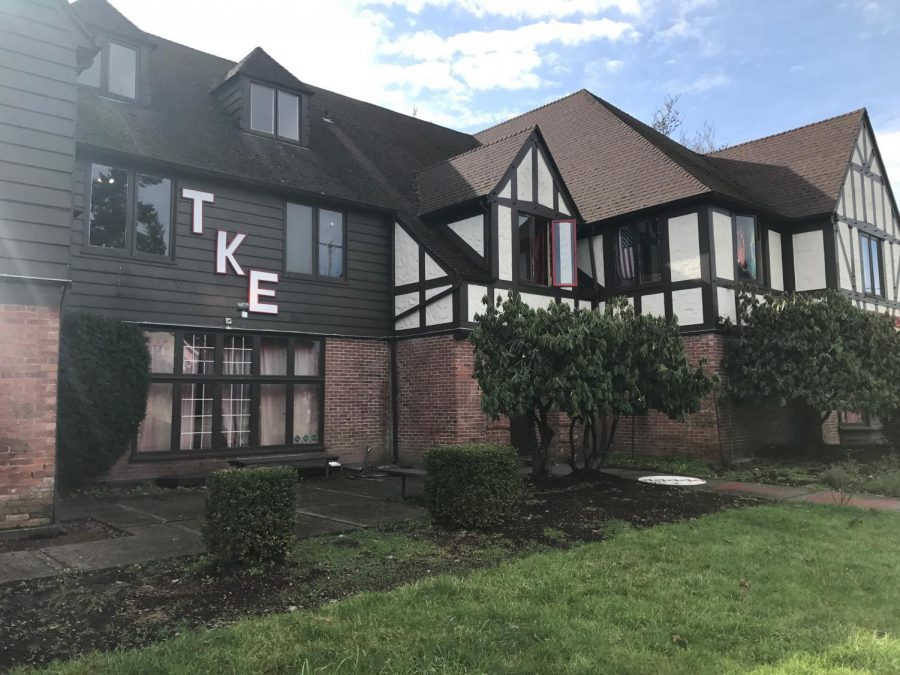Greek chapters participate in Affiliated Housing Program
February 19, 2017
AHP allows first-year students to reside in alternative living situation
First-year students at Oregon State University typically reside in the residence halls, however the Affiliated Housing Program makes it possible for a select few to live elsewhere, including certain fraternity and sorority houses.
The Affiliated Housing Program allows first-year students the option to reside in an alternative living situation registered within the program, that would remain a similar living-learning environment when compared to living on campus. In other words, it is an exemption from the first-year live-on requirement by Oregon State. At the moment, the only houses in the program are housed chapters in fraternity and sorority life.
Leslie Schacht, director of The Center of Fraternity and Sorority Life, is one of four on the committee that oversees the AHP and approves applications.
“The requirement for first-year students to live on campus was something that could negatively impact housed fraternities,” Schacht said. “If part of their population that live in their home was no longer going to be able to live there, what would that do for their, in a sense their business model. Would they be able to still afford the same level of amenities? Could that impact their living arrangement?”
The AHP began getting drafted by alumnae of the organizations and Oregon State University during fall of 2013 in order to “increase retention and success for all students and student groups through an integrated living and learning environment,” according to the Center of Fraternity and Sorority Life website. It was fully implemented in fall of 2014.
Currently, there are six fraternities, including Tau Kappa Epsilon, Acacia, Kappa Sigma, Phi Gamma Delta, Sigma Alpha Epsilon, and Sigma Phi Epsilon, and one sorority participating, Sigma Kappa.
While Madison Smith, president of Tau Kappa Epsilon, lived in Hawley-Buxton residence hall as a freshman, he has seen firsthand the program being implemented in his chapter, as there are roughly eight freshmen living in TKE this year.
“You come in as a freshman and you can move in after your fall term or if you rushed in the summer you can come in then,” Smith said.
The application process for the AHP requires proof of the program requirements, which includes ten areas: fire safety expectations, kitchen health and sanitation, livability code, proof of liability insurance, property insurance, indemnity clause, OSU Policy of Nondiscrimination on the Basis of Disability and other requirements.
“Nationally, statistics show that students who live on campus for their first year are more successful students,” Schacht said. “They are retained at the institution, they have better grades, and they report a higher sense of belonging at the institution”
Due to this, there are educational standards that must be met, as well. Examples of programs would be workshops from the Academic Success Center, or other workshops that are approved by the AHP Review Committee. This year, this specific requirement has been increased to nine programs per year.
“We just try to encourage the freshmen to go and study more and have more participation on campus since they aren’t getting the dorm experience, being that they are first-year students. We just want to make sure that they’re keeping up with their classes, essentially,” Smith said.
Graeme Weir is a freshman and holds the position of house secretary and the president’s assistant in TKE. He is currently an AHP participant.
“The best part about living in the house is definitely the convenience, since I spent most of my time at the house anyway, it just means I don’t have to commute 20 minutes each way from the dorms,” Weir said. “Also being able to hang out with my brothers and bond with them more closely.”
Another TKE AHP participant, Brian MacInnes, found out about AHP through a meeting with
his old president.
“I enjoy being able to live with my friends and make a positive impact on the community,” MacInnes said.
The application operates on a three-year cycle. Applications are currently open for the second three-year cycle and will be due April 1. The organizations will be announced June 1, after the AHP Review Committee has reviewed the applications.
The committee is made up of Schacht, Jonathan Stoll, director of Corvallis community relations, Robert Reff, director of prevention and health promotion at Student Health Services, and Willie Morgan, assistant director of student conduct and community standards.
“These are things our chapters are already doing. It’s just proving it,” Schacht said.
None of the housed fraternities or sororities are owned by the undergraduate student organization, but rather are owned by a variety of private groups including a private non-profit organization (housing corporation board), national organization, one private person, or a management company that leases to the local chapter.
“I think everyone should look in a Greek house at some point if you are Greek affiliated,” Smith said. “It’s a lot of fun and it is definitely a unique experience. It’s also a good way of finding future roommates for when you decide to move out of your Greek affiliated housing.”
Currently the only houses involved are within the Greek community, but Schacht said she would love to see it expand. With typically 50 to 60 first-year students living in the AHP chapters, the cohort is a sizable cohort, according to Schacht.
“What is the value in this program? I think we could come up with a lot, but honestly what it comes down to is you get penalty-free contract breaks with the residence halls,” Schacht said.
To learn more, visit Oregon State’s Center of Fraternity and Sorority Life: Affiliated Housing Program.
























































































































